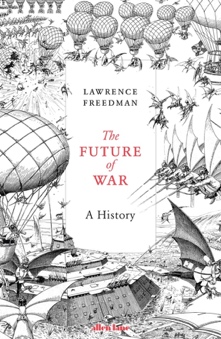The Future of War is a history of predictions about the character of war and the reduced likelihood of war. The short version of Freedman’s conclusion is that these predictions have almost always been wrong. He demonstrates that the reality of war often contradicts expectations, less because of some fantastic technical or engineering dimension, but more because of some human, political, or moral threshold that we had never imagined would be crossed. For example, in 1912, Sir Arthur Conan Doyle wrote a short story about a war fought from underwater submersibles that included the sinking of passenger ships. It was dismissed by the British admirals of the day, not on the basis of technical feasibility, but because sinking civilian ships was not something that any civilised nation would do.

In writing The Future of War Freedman challenges contemporary practitioners to not focus excessively on future technology or to ignore the socio-political drivers of the conflict. He does not make his only predictions about future war but he does question the utility of characterising future wars using ‘sexy’ terms such as ‘multi-dimensional’, ‘hybrid threats’, ‘non-linear subversion’, etc. He notes that the paradigms war, peace and criminal activity are becoming increasingly blurred.
The Future of War is divided into three parts (although it is not obvious why) and 25 chapters that address a variety of themes. His last chapter is playfully titled “The Future of the Future of War”. Freedman’s research is extensive and his analysis focuses on professional and amateur assessments of the direction and character of war over the past two centuries. The book examines how militaries and societies have anticipated the potential for armed conflict as well as how new technologies and changes to the global order have been considered (or have failed to be considered) among the various influences on ‘future conflicts’ of each age.
While many of the book’s case studies relate to premonitions of 20th century generals, political leaders, spies and nuclear strategists, Freedman also highlights the predictive value of fictional authors from Arthur Conan Doyle and H. G. Wells to P. W. Singer and August Cole. Freedman suggests that the fundamental purpose of many claims about the future of war have less to do with prediction and more to do with exerting influence.
Just as Freedman highlights those who have shown clairvoyance in predicting the nature of future wars, Freedman criticises those who have argued that war is a dying anachronism – such as the Nobel Peace Prize laureate Norman Angell – whose book claiming that the ‘economic futility of war would ensure it never occurred again’, was released only a few months before the initial salvos of World War I. Unsurprisingly, Freedman, having dedicated his life to studying wars, does not expect the phenomenon to disappear from the list of characteristics of the human condition.
All the while, Freedman uses his half-century of experience at the forefront of national security debates to highlight the logical flows from imperial conflicts to modern challenges such as terrorism, offensive cyber capabilities and even violent criminality. At the same time, Freedman argues against what he sees as the tendency for national leaders, militaries and industry to look toward the next technological ‘silver bullet’. As such he argues against what he considers as a general tendency for futurists and military/strategic practitioners to focus on technological changes and their impact on war, without due consideration to the social factors influencing conflict – what he describes as a general inclination toward focusing on the changing character of war, while ignoring its enduring nature.
The Future of War demonstrates the importance of innovation and underwrites why constant learning, discussion and a body of predictive writing about future security challenges is critical to success in the face of unknown threats – particularly those malign actors yet to present themselves. As Freedman states, ‘history is made by people who do not know what is going to happen next’.
Sir Lawrence Freedman is Emeritus Professor of War Studies at King’s College London. He was the official historian of the Falklands Campaign, and a member of the official inquiry into Britain and the 2003 Iraq War (‘the Chilcot Inquiry’). He has written extensively on nuclear strategy and the Cold War, and comments regularly on contemporary security issues. His most recent book, Strategy: a History (Oxford University Press, 2013), was a Financial Times and Economist book of the year.
The Future of War includes extensive notes, a comprehensive bibliography and a detailed index. The book is filled with fascinating insights from one of the most brilliant military and strategic historians of his generation and is recommended to students of military history as well as contemporary practitioners of the profession of arms.
Contact Marcus Fielding about this article.






